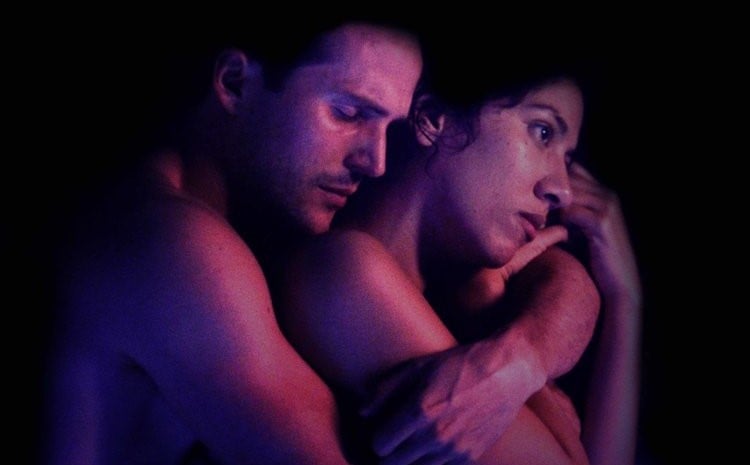We’re very used to seeing rape as a catalyst in film, either to spur a man’s story (a woman in his life was raped, so he must avenge her!) or to be a woman’s backstory, because women are apparently incapable of greatness without being subjected to rape or brutality. The Light of the Moon is important precisely because it portrays rape as something that is sadly normal, something to be gotten through in the day-to-day, not as the catalyst for major events.
Brooklyn Nine-Nine‘s Stephanie Beatriz takes a wonderful, dramatic turn as Bonnie, a young and successful Latina architect who is sexually assaulted while walking home from a night out with friends in Brooklyn. At first, she tries to keep the assault a secret from her long-term boyfriend Matt (Michael Stahl-David), but the truth quickly emerges.
Bonnie emphatically denies how much the rape affects her as she fights to have everything “go back to normal.” Yet returning to her old life is harder than she thought. Her attempt to recapture the intimacy she had with her boyfriend falters and cracks begin to surface in their relationship. Another assault in the neighborhood only drives Bonnie further into denial, before an encounter with an at-risk woman causes her to face the truth and confront her own self-blame.
The film was written and directed by Jessica M. Thompson, and both her tight script and her clear direction go a long way to capture the nuance of Bonnie’s journey as she deals with her trauma.
One of the most interesting things the film depicts is the fact that, despite having been drinking the night of her attack, Bonnie does everything right. She goes right to the hospital after it happens and resists the urge to shower so that she doesn’t ruin evidence. She preserves her underwear and tissues with evidence on them in a bag to give to the police.
Later in the film, her lawyer points out that “If you were black, or [your attacker] were your husband…you’re one of my easy cases.” Her rape kit actually gets examined, not stuck in a backlog.
And yet, despite all of that, she has no real chance at justice. She still has to deal with victim-blaming from law enforcement and doctors. Even harder for her, however, is dealing with the response her boyfriend, who wants so much to help her get through it, but doesn’t know how.
The relationship between Bonnie and Matt is one of the most realistic things in the film. There is genuine love between them, but this traumatic event in Bonnie’s life rocks both their worlds. Matt begins to overdo his care of her, which only spotlights the ways in which he was inattentive before in his relationship. Meanwhile, Bonnie uses his trying to help as a free pass to take all of her anger and sadness out on him while forgoing any kind of professional help, or indeed any true acknowledgment of her own feelings.
On the one hand, I found myself wanting to shake Matt and tell him to follow Bonnie’s lead because he couldn’t possibly understand what she’s going through. On the other hand, I found myself wanting to shake Bonnie and tell her that she only thinks she has this under control, but she doesn’t, and if she’s not careful she will turn into someone she doesn’t want to be.
Beatriz gives a stunning performance as Bonnie, beautifully navigating the many ways Bonnie tries to manage her own feelings, from gallows humor to angrily lashing out, to breezily insisting that she’s “fine” and that “everything’s okay.” She is always sympathetic, even in moments where Bonnie isn’t particularly likable, or when she’s particularly frustrating.
Stahl-David also gives an amazing performance as Matt. In lesser hands, Matt might have come off as a dense jerk. Stahl-David, however, never allows us to forget Matt’s earnestness and love for Bonnie. Also, despite all the ways in which he’d been inattentive in their relationship, he’s also surprisingly emotionally articulate and is constantly encouraging Bonnie to tune in to her feelings, rather than shoving them aside.
The film is full of normal moments turned not-normal by Bonnie’s experience, and it hammers home just how necessary it is to see real, lived-in, and not sensationalized or heightened depictions of life after rape. For someone who’s been through the experience of sexual assault, it’s more often than not simple things like walking down the street, or trying to maintain a relationship with a significant other, or interacting with the outside world with bruises onlookers think your boyfriend gave you.
Seeing depictions of that goes a long way toward taking away the shame many have in talking about their experiences, which might allow them to better heal. In the era of #MeToo, that’s an important mission to take on, and The Light of the Moon succeeds with heart and sensitivity.
The Light of the Moon is now available on Amazon Prime or on Digital VOD services.
(image: Steadfast Productions)
Want more stories like this? Become a subscriber and support the site!
—The Mary Sue has a strict comment policy that forbids, but is not limited to, personal insults toward anyone, hate speech, and trolling.—








Published: Mar 6, 2018 06:08 pm